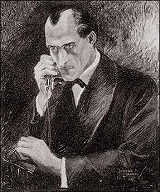
“Yes, he has been here. I understand that you don’t know him. ... How long? ... Only two days! ... Yes, yes, of course, it is a most captivating prospect. Will you be at home this evening? I suppose your namesake will not be there? ... Very good, we will come then, for I would rather have a chat without him. ... Dr. Watson will come with me. ... I understand from your note that you did not go out often. ... Well, we shall be round about six. You need not mention it to the American lawyer. ... Very good. Good-bye!”
It was twilight of a lovely spring evening, and even Little Ryder Street, one of the smaller offshoots from the Edgware Road, within a stone-cast of old Tyburn Tree of evil memory, looked golden and wonderful in the slanting rays of the setting sun. The particular house to which we were directed was a large, old-fashioned, Early Georgian edifice, with a flat brick face broken only by two deep bay windows on the ground floor. It was on this ground floor that our client lived, and, indeed, the low windows proved to be the front of the huge room in which he spent his waking hours. Holmes pointed as we passed to the small brass plate which bore the curious name.
“Up some years, Watson,” he remarked, indicating its discoloured surface. “It’s his real name, anyhow, and that is something to note.”
The house had a common stair, and there were a number of names painted in the hall, some indicating offices and some private chambers. It was not a collection of residential flats, but rather the abode of Bohemian bachelors. Our client opened the door for us himself and apologized by saying that the woman in charge left at four o’clock. Mr. Nathan Garrideb proved to be a very tall, loose-jointed, round-backed person, gaunt and bald, some sixty-odd years of age. He had a cadaverous face, with the dull dead skin of a man to whom exercise was unknown. Large round spectacles and a small projecting goat’s beard combined with his stooping attitude to give him an expression of peering curiosity. The general effect, however, was amiable, though eccentric.
The room was as curious as its occupant. It looked like a small museum. It was both broad and deep, with cupboards and cabinets all round, crowded with specimens, geological and anatomical. Cases of butterflies and moths flanked each side of the entrance. A large table in the centre was littered with all sorts of debris, while the tall brass tube of a powerful microscope bristled up among them. As I glanced round I was surprised at the universality of the man’s interests. Here was a case of ancient coins. There was a cabinet of flint instruments. Behind his central table was a large cupboard of fossil bones. Above was a line of plaster skulls with such names as “Neanderthal,”“Heidelberg,”“Cro-Magnon” printed beneath them. It was clear that he was a student of many subjects. As he stood in front of us now, he held a piece of chamois leather in his right hand with which he was polishing a coin.
“Syracusan - of the best period,” he explained, holding it up. “They degenerated greatly towards the end. At their best I hold them supreme, though some prefer the Alexandrian school. You will find a chair here, Mr. Holmes. Pray allow me to clear these bones. And you, sir - ah, yes, Dr. Watson - if you would have the goodness to put the Japanese vase to one side. You see round me my little interests in life. My doctor lectures me about never going out, but why should I go out when I have so much to hold me here? I can assure you that the adequate cataloguing of one of those cabinets would take me three good months.”
Holmes looked round him with curiosity.
“But do you tell me that you never go out?” he said.